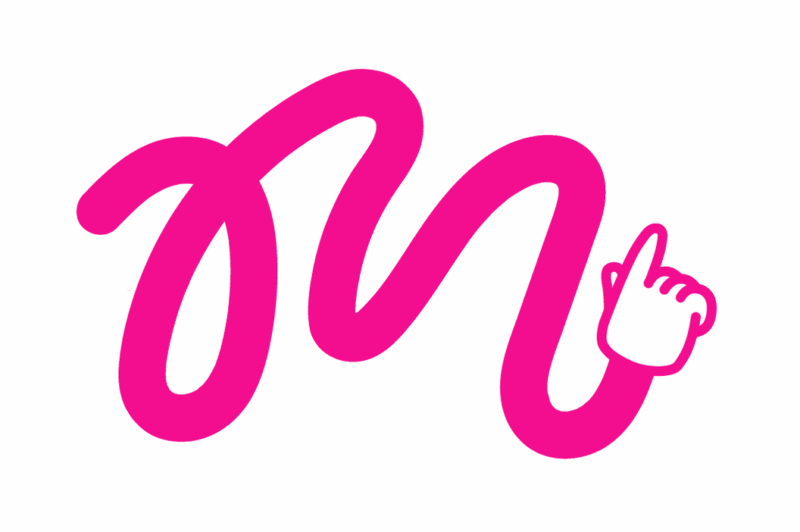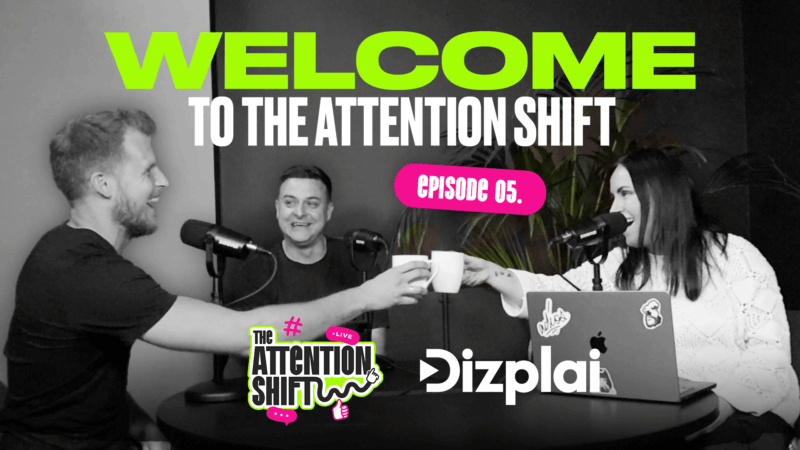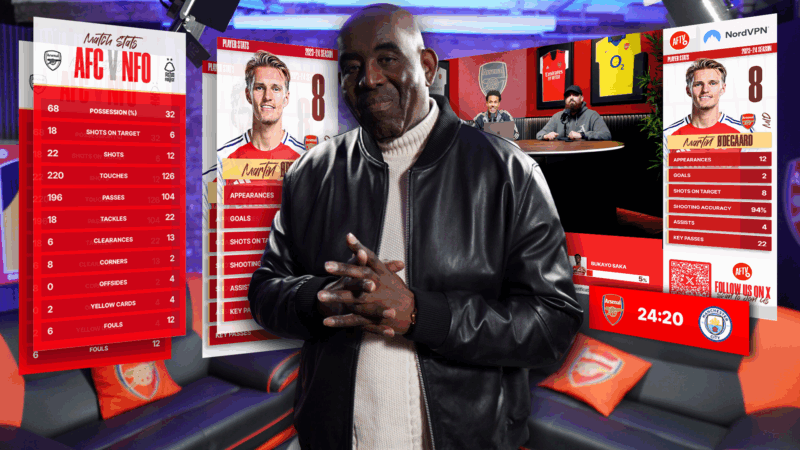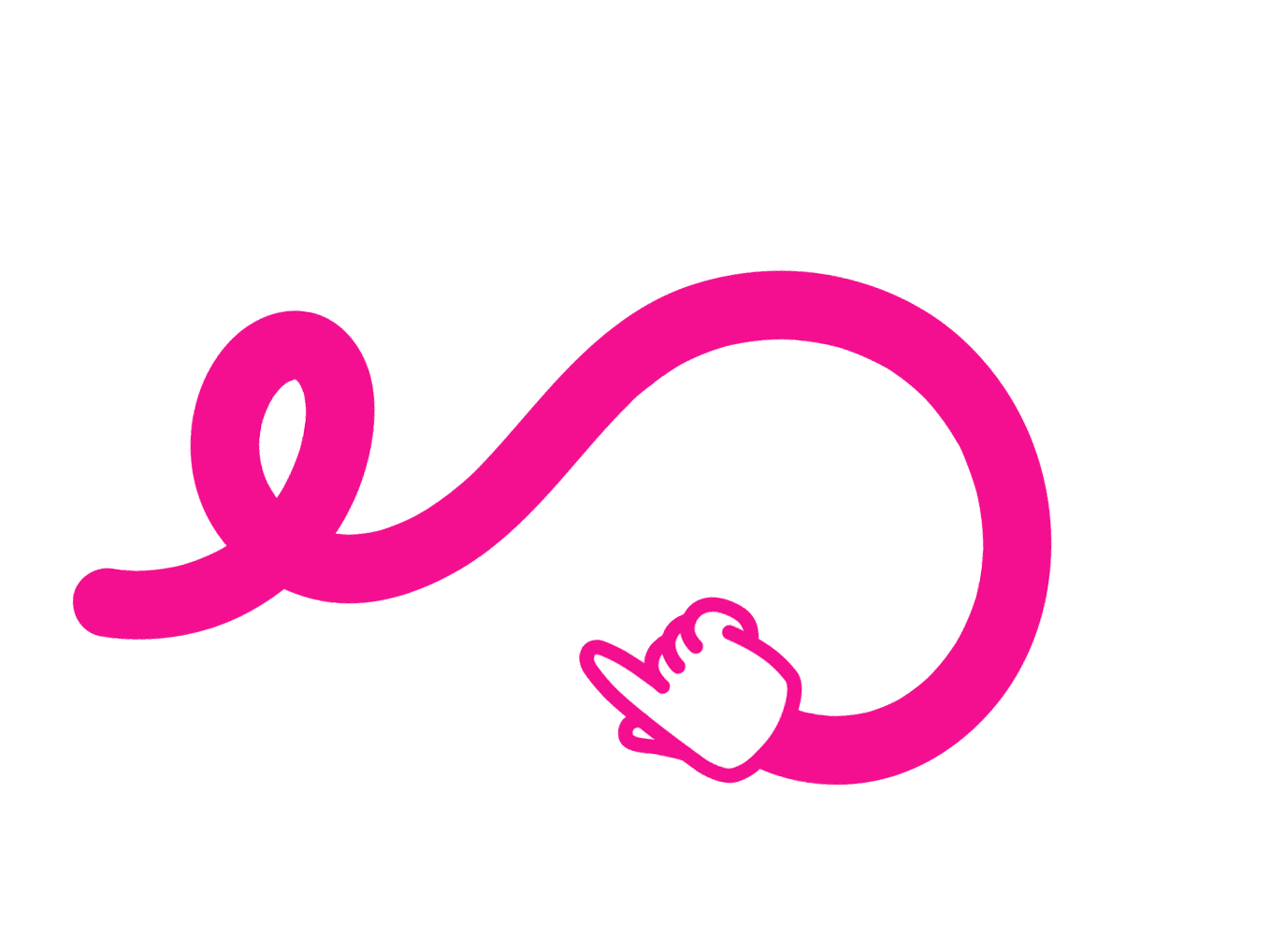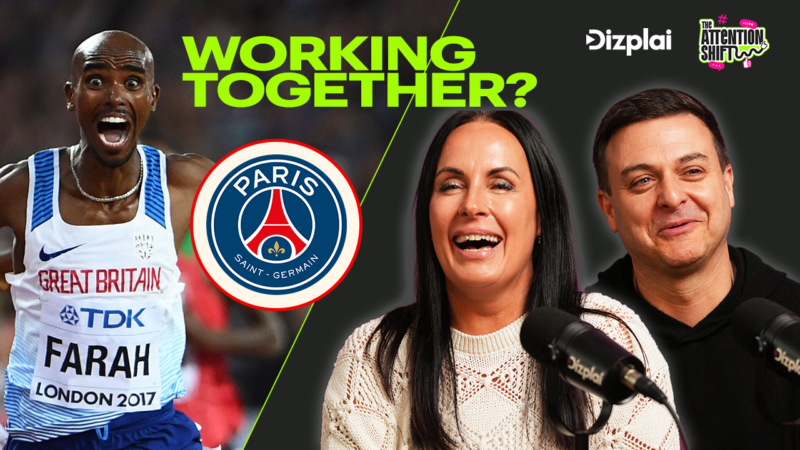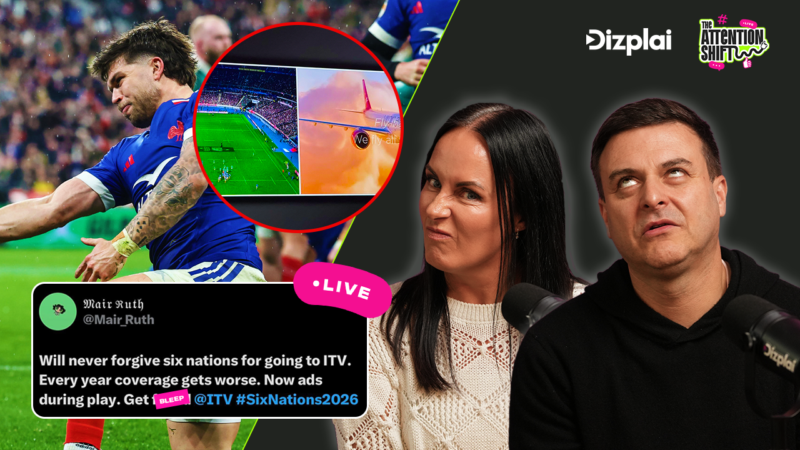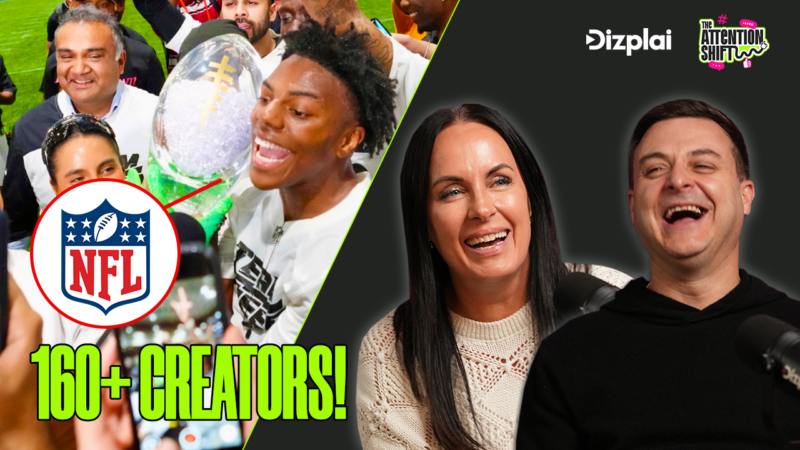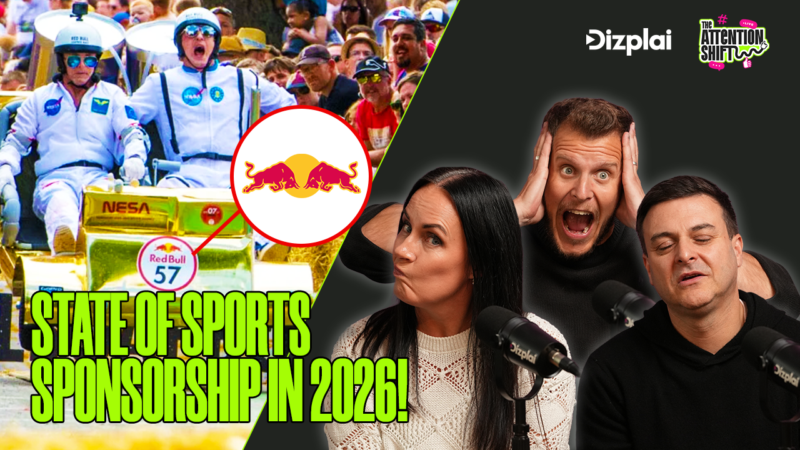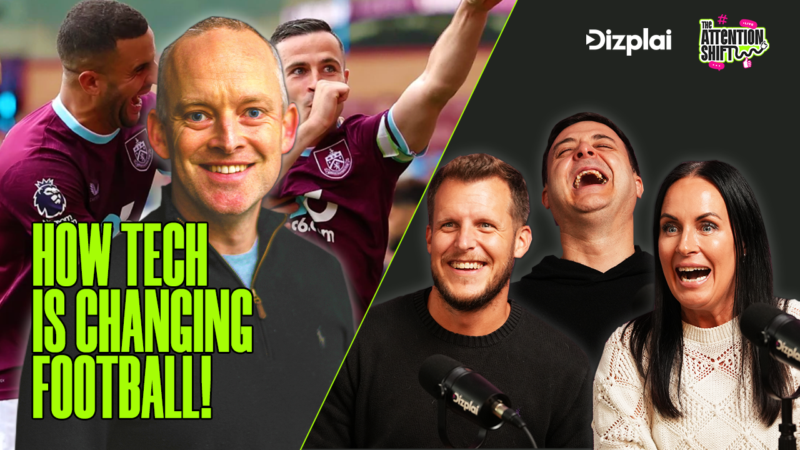
Summary
- CazéTV’s World Cup Coup: How a digital disruptor beat broadcasting giants to FIFA’s crown jewel in Brazil,
- 6.15 million concurrent viewers on YouTube—free streaming just broke records and rewrote the playbook.
- Ad-supported streaming vs. traditional rights deals: A new model for sports monetisation emerges.
- The democratisation debate: Is free access levelling the playing field or extracting hidden costs.
- From paywalls to platforms: How CazéTV proved digital-first can compete with legacy broadcasters.
- Trading cash for data and attention—Ed, Jo & Lee unpack what fans really pay when sports go “free”.
Transcription
Hello and welcome to another episode of The Attention Shift podcast.
I’m Jo Redfern.
I’m Ed Abis.
And I’m Lee Radbourne.
And today we are going to be talking, well, Lee has come up with the title for this,
the Sports Rights Hunger Games.
That was his second attempt.
But this week, lots of movement in the sports rights market.
We’ve had NFL taking a stake in ESPN.
We’ve got a mammoth deal for UFC with Paramount Plus.
These are mega deals.
Yeah, at the other end of the scale, we’ve got DAZN and Ligue 1 fighting.
That relationship has broken down.
Feels like we’ve got a two-tier, two-speed economy in sports rights emerging.
So we’re going to discuss that today.
Who are the big winners?
Let’s talk about NFL.
NFL is a big winner, obviously.
It feels like the NFL are always big winners in this.
They always go for the Super Bowl.
So to recap, NFL, 10% stake in ESPN, launching their new streaming platform, ESPN Plus.
Control distribution, good for NFL to have a stake in ESPN as it transitions from cable network
and its linear routes into streaming.
What do you think it brings both of those parties?
I mean, look, what it means for viewers is obviously you get NFL Red Zone now on ESPN,
which is also a big flagship program and also flagship in the industry
when it still remains a flagship in the industry.
Obviously, you’ve got the live games also incorporating
obviously another big aspect of the fantasy football side of things.
So from a fan point of view, it’s a good, hopefully a good thing.
It’s hopefully one less subscription you have to buy.
And obviously with ESPN, with NFL getting 10% stake in ESPN, it’s good for them
because it means they have, you know, not reliant on them producing content all the time.
They are probably one of the biggest producers of content,
you know, all the different shows that they have around it,
which you do get with sort of flagship rights like the NFL and UFC.
But I think it’s a good deal for them.
It obviously has larger ramifications, I think, for the market.
Yeah, obviously there’s a focus there on the US, right?
And it is very much as much as it ends up making global news,
it’s a very US-centric deal.
And the US is a different market than most markets, right?
And it’s interesting that as the world is changing in terms of how content is being distributed,
in the US, the NFL still feels the need to take a 10% stake in the legacy media organisation.
And look, ESPN, you know, because of, you know, cable cutting and all the rest,
they’re all trying to make a real play to be more of a digitally focused organisation.
But like any major juggernaut, it’s damn hard to turn that around and do that.
So I just find it really interesting that the NFL at this point,
when you’re thinking that sort of world is only going in one direction,
why they’d want to take a 10% stake.
But again, was that almost like a bit of a sweetener and is not the main driver in any of this?
And it gives the NFL the ability to have one foot in both camps.
You know, you don’t switch off cable subscribers
and then they all move to digital and DTC platforms.
It is a transition.
So it feels like this allows them to have one foot in each camp.
They’ve still got the ability to distribute through more legacy channels,
but then they’ve got ESPN Plus, which, I mean, up until relatively recently,
they’d announced that they were going to launch it, but it felt quite light on content.
And then now, I mean, even in the last week or so,
they’ve done this deal with NFL for a 10% stake.
And they also swept up all the old premium live events for WWE,
which is another interesting thing.
These are big deals.
Are we seeing this kind of split that we spoke about,
where we’ve got the premium tier here?
What happens to this squeezed middle?
Yeah, look, I mean, aside from the media rights,
and I was reading through some of the things that are happening as part of that,
there’s an interesting thing that the deal also includes the merging
NFL fantasy football with ESPN fantasy football.
So there’s a massive data and fan engagement play there as well.
So it gives both sides a larger pool of fan data
and allows them to not be competing against each other
because they probably have been right.
So in theory, it’s a much bigger play.
And then the way the US market is now changing when it comes to betting
and the monetization of that,
arguably that might be one of the more exciting parts of this,
although it’s probably one of the smaller things on the deal sheet.
You’re probably right.
You’re probably actually thinking about that
is probably one of the better fixed aspects of the deal
is that first party data collection with people
who are willingly giving you your data.
And I was just thinking, as we’re talking about now,
does this put ESPN as a direct competitor to someone like DAZN?
DAZN has the international NFL rights for 10 years.
So I think it was a few years ago when the deal first got signed.
It does feel a bit like there’s the US.
I mean, it really does feel a bit like that sometimes,
but the US versus the rest of the world
in terms of these media deals.
And again, I know we’re going to talk about some of the lower leagues,
sort of the medium tier rights.
We’re going to talk about Benfica and DAZN and Ligue 1 in a bit,
but it does feel a bit like this is a big play for Disney and ESPN.
And then when you bundle that in with the other big news this week
with Paramount Plus,
them getting the UFC rights deals,
again, in a $7.7 billion deal over seven years,
someone obviously liked the number seven.
Yeah, I think when it gets to that point,
another 0.1 of a billion doesn’t really matter.
Again, that removes the pay-per-view.
That’s going to be, in essence, you buy your subscription.
It just feels there’s some big plays going on.
But none of them are standard.
They’re all different.
And I think that it comes down to, well, I mean,
ESPN obviously owned by Disney,
so it makes sense to incorporate NFL, big family viewing.
Probably one of the major kind of family viewing sports events in the US.
But then that data brings it into Disney Plus.
They can cross-sell.
They can aggregate inventory when they’re selling it to advertisers across all of them.
Paramount’s slightly different.
Obviously, it’s just got new owners.
We’ve got Paramount Plus, UFC, very, very loyal fan base by all accounts.
Peacock, before they lost WWE Premium Live Events,
went on record as saying they were really big subscribers.
So if you think about that in terms of UFC,
that’s irrespective of how much they’ve paid for it,
that’s going to be a big subscriber into Paramount Plus, that UFC content.
But having paid 7.7 billion for it,
they’re going to have to hope that those subscribers stick around
and then watch a ton of other content.
We were looking at this when we were at Look,
and you’re always working on the basis of available figures
and no one ever reveals the numbers, right?
But from what we were reading earlier,
that apparently, like, UFC had,
I’m trying to think it was according to here,
600,000 paying members as part of their UFC pass, right?
So, and they’ve just been paid 7.7 billion.
So we were having a bit of a look at…
It’s eye-watering.
Look, like, whether Paramount‘s going to increase the cost now
because they’re doing that will create different packages.
But, you know, for their Showtime plan,
which is $120 a year,
they’re going to need to put on 9 million subscribers,
something that the UFC themselves have not managed to do
over a long period of time.
And then we were chatting earlier as well, right,
that about would Dana White have done this
if he was still in total control of UFC in its own right
rather than part of TKO?
And that opens up a whole can of worms.
I’m like, why has this happened?
And is this TKO trying to, like, take a bit of money back out?
Well, yeah.
Sorry, there’s lots on that there.
When you’ve got shareholders and Wall Street,
it changes.
TKO needs to prove itself now.
I mean, they’ve done the Endeavour, you know,
taking all the best assets out of the old Endeavour brand
and gutting what they could and selling off what they could
and basically taking the best bits into TKO anyway.
You now need to monetise quickly, I guess.
And I know we joked a bit earlier about,
is there, you know, Paramount had to pay some money off
to a certain president.
And by the way, they’re having a UFC fight on the White House lawn.
Yeah, they announced that a few weeks ago.
I don’t know if it was just a joke.
Is that in the Rose Garden that they’ve just paved over for it?
Maybe that’s it.
They’re going to convert it into a sports stadium.
I mean, actually, now we know you say it.
It feels perfect for the Rose Garden.
That’s why he concreted over the Rose Garden.
So you can put whatever you want on it.
So that’s what $16 million buys you, apparently.
$7.7 billion, whatever.
But it seems like, the Paramount thing, right,
obviously that’s the sporting news of the last couple of weeks,
but also there was some other news a couple of weeks before that.
I mean, brilliant videos, by the way, that they did with South Park.
But the money that was spent on South Park as well
to make sure they got that.
So Paramount are certainly splashing the cash.
Well, they’ve got to make a success of it now.
It’s been hard for this whole Skydance merger.
It’s been in regulatory hell.
So now they’ve really got to make a good fist of it.
Even if it…
I mean, what would success look like then for them?
You know, if they’re not going to, let’s be honest,
how are they going to get their money back on this deal from the right?
And like you said, they’ve just spent $1.6 billion on South Park.
You know, where are they going to get their money back from this stuff?
It feels like there might be more content to squeeze out of UFC.
I mean, it’s pretty light on…
You’ve got the numbered events,
but then you’ve only got about 30 fights, I think, in between that.
So it feels like there’s probably room to expand that.
And then all of the shoulder content and programming,
actually, you could create around it.
I imagine there’s some pretty compelling stories.
Will they go down the WWE route where they bring in more narrative?
It’s always felt that UFC is slightly more about the actual discipline itself.
But who knows, you know, Paramount‘s an entertainment company,
so it could be that there’s big plans.
You know, it gives them the rights to then take, you know,
bigger stories or make bigger stories.
So as we’re trying to be more organised, right,
and have some sections to this podcast as we move forward,
and this, in theory, is the big winner section, right?
Who do you think are the big winners in all of these deals
that are going on at the moment, and why?
I don’t know. It feels so messy.
It feels like there could be another one announced next week,
and people would be like, oh, never saw that one coming.
I don’t know US sports rights deals as very well.
I don’t know sports rights deals that well at all, to be honest.
Well, thanks for joining us today.
I could talk about media consumption shifts,
but rights is different.
I don’t know. I think it’d be interesting to apply this to Europe
because it feels like European deals are very, very different.
Very different, yeah, yeah, yeah.
And we don’t chop things up in the same kind of way
that happens in the, like, you know, obviously with the wrestling, right,
you can have that there, you can have that there,
and you can have that there.
Like, we generally do one deal.
And they’re close, you know, the US leads are close leads
and they’re relegation.
I mean, we’re going to talk about Europeans next,
about some of the losers, maybe.
But I’m going to push you on an answer.
Pick a winner.
I don’t know. Any winner.
I don’t know. I guess you don’t know.
I don’t know who’s still the first.
MLB.
Fair enough.
I think Disney‘s went out of this one.
Oh, are you talking about the streamers?
Yeah, yeah, yeah.
How are these particular players in the market?
The rights holder, the media company, like,
an individual within one of those companies.
I’m waiting to see.
I just, I feel like YouTube need to do something.
I feel like all of these other platforms are doing something.
We’ve got ESPN.
We’ve got Disney.
We’ve got Paramount.
I think that YouTube are quite…
Are they on a watching brief?
I think we’ll talk more about YouTube
when we’re going to the Squeezed Middle tier
because I think they’re quite happy to play in that space.
So I’m going to come back to that.
Come back to you on that one.
So I think Disney are the winners in this.
I think it’s good for them to get the NFL rights.
I think, you know, they’ve been looking to get some…
They’ve been toying more into the sports market.
You know, they’ve been doing Women’s Champions League
this season on Disney Plus in the UK.
And there’s other little bits that they’ve been…
Just taking La Liga as well in the UK.
Saturday evening games.
Exactly.
So they’re starting to get more content.
I think getting the NFL rights in the US is massive.
Full stop.
It’s the biggest media property by a country mile.
When you see the graphs and you’re like,
the NFL is up here and everyone else then starts here.
Miles apart.
And I think it’s good for ESPN.
And they’re obviously breaking out their ESPN as a separate brand.
They needed to do the cord cutting
and this feels like a right deal to do that.
Yeah.
And with all the data collection that comes with it,
you know, you can see this could be a good movie.
The Paramount one, you know…
You’re only allowed one answer.
But on the flip side, the Paramount one,
the Paramount one does feel a bit like it will have a small bump.
But again, it feels a bit like just, you know, what can we do?
If I had to pick a winner,
I’d say that ultimately at the moment based on what,
where UFC were and what Paramount are going to have to do to fund it.
And we don’t know the…
Because I think UFC and the people behind it,
because they’ve got an opportunity to take some more cash out.
I think TKO probably the biggest winner out of that so far for me.
But like I say, there might be another deal next week.
Yeah, yeah.
Let’s talk about DAZN.
Because this kind of throws into question
how that kind of platform is going to work.
DAZN being the largest sports-based DTC.
Yeah, okay. So let’s talk about DAZN.
So if we take a bit of a history lesson into DAZN,
like DAZN did try and crack the US
and we’ve talked about this before,
which was typically DAZN always went into a new country
by buying the rights to sort of a big thing.
Serie A in Italy, NFL in Canada, J League in Japan.
Yeah, and then I think to add to that as well
and do it in a way that they showed that they were more,
I guess, digitally video literate than anyone else in that market.
Yeah, and being the first, right?
They were the first ones to kind of do the streaming.
I mean, don’t get me wrong.
I mean, they broke the internet in Italy numerous times.
Yeah, but some people say innovation,
you can’t do without cracking a few eggs, right?
And they had a few people in Canada not knowing
that they couldn’t get on their cable TVs anymore.
And I’ve mentioned this before,
when they did that sort of worldwide expansion,
specifically in the US,
was they led with boxing and sort of fighting sports
and it didn’t really work
because they didn’t have enough content.
So it does feel a bit like, for DAZN,
they’ve obviously brought Foxtel now in Australia.
Yeah.
They’ve got FIFA Plus, which was a standalone app,
and now all that content’s been brought into that.
Obviously, they’ve just done the Club World Cup,
regardless of these, let the conspiracies fly
about how the money flows.
More conspiracies.
Yeah, how the billion dollars flows
between all these interlinked operations.
But I think the one we want to talk about
and what it means for these sort of,
who are the losers in this sort of,
if you’re not there for one,
if you’re not an NFL, if you’re not the Premier League,
you have to look at Ligue 1 in France.
It was the first season, it was this massive deal,
467 million media deal,
which obviously never happened as we’ve all kind of silvered for.
That eventually got taken court.
I think DAZN settled for $100 million in the end.
And recently, this week, it’s just announced
that they will take some games back again on the platform.
But Ligue 1 now has launched its own D2C platform
with some very ambitious subscription targets.
I think their goal is 1 million this season.
You think about it, it sounds low in sport
when we talk about some of the numbers we talk about in sport.
1 million this season,
but 2.5 to 2.9 million in the next four.
I think that’s achievable.
It’s just really hard from a standing start, right?
When the audience, you’ve been trying to educate them
to go and do it in a certain kind of way,
and now you’re trying to re-educate them
to go another kind of way.
And in quick succession.
When the product’s not different than it was before
and they’re asking,
why am I paying this for this now
when I was paying that before?
And nothing’s changed about it.
And arguably, the French league have lost a few marquee players.
So in theory, it’s not as good as it was before.
And Paris has been an issue over the last few years.
So that underpins all of that.
Oh, go over here and do this.
Oh no, now this season, come over here and do this.
Interestingly, you have got a new Paris team now
playing in Ligue 1 this season.
So that’s going to be some kind of rivalry going on there.
And they’re not far from each other as well.
So I think coming back,
when we had the discussion about the women’s game,
the numbers are kind of like, yeah, but look,
the league’s changing with different teams coming in,
different teams going out.
That does have an impact on it.
And that’s going to be a really interesting rivalry
in Ligue 1.
The Paris team has gone off against each other,
which are two seconds from each other at the moment.
But I think that’s the challenge, right?
The challenge is, like you said,
the rights been sort of flip-flopping around
between national TV providers and broadcast providers.
DAZN had a stab at it, weren’t getting the numbers.
I believe that, you know,
how many big names are there in the French league,
apart from PSG, maybe Marseille.
I’m trying to think.
You’ve got Dwight McNeil.
He’s just got to Marseille from Burnley.
Obviously he’s a big name.
Obviously a huge name.
No, but joking apart,
Marseille have built a bit of a backbone
of English players there now.
So in theory, you might,
it’s similar to what the league are trying to do,
similar to what Bundesliga are trying to do,
where they’re trying to reach a UK audience.
Ligue 1 will try and do a similar kind of thing as well,
but they’re all sort of playing in the same market,
so it makes it difficult for them.
But there’ll be some interest there.
We talked about this, didn’t we,
how younger people now follow players more so than teams.
So there’ll be a bit of that.
But if, you know, we said the winner of the,
you know, I felt the winner of the last one
was, you know, the NFL doing an ESPN
and taking a stake in ESPN
because they have, you know,
you’re part of a wider catalogue of content and sports
that you’re not just once a week
or your favourite teams are maybe once a week.
You know, Ligue 1 couldn’t get that deal.
You know, they tried doing that deal with DAZN.
They tried going for the big rights deal,
and it didn’t work.
And now they’re, I think they’ve actually said that on their,
they’ve told all clubs to put their media value at zero.
Yes, I read that.
Well, that’s a good place to start.
What was the subscriber goals
when Ligue 1 went to DAZN?
Because it was supposed to be a billion euros, right?
But how many subscribers had they promised DAZN?
And DAZN didn’t end up getting them,
so it took them to court.
It’s a good question.
I’d have to quickly…
It’d be interesting to see how that stacks up
against the 1 million subscriber goals for this season,
because I can’t see consumer behaviour
flip-flopping to that extent.
I can’t see DAZN.
I think DAZN would have probably imagined
that we’ve got more than a million,
but, you know, that million would have been a realistic,
I felt, a realistic target.
It’s a good question.
I think the original target was 1.5 million subscribers,
and the deal between DAZN and Ligue 1 was
that if they got to that,
that Ligue 1 would get a automatic…
Bonus.
50 million euro bonus.
So, yeah, 1.5 million.
But they didn’t get anywhere near that.
They were like hundreds of thousands then.
So I think that makes them
1.5 million subscribers this season.
Yeah, so I think 1.5 million seems the most likely, right?
And even that might be a push.
But like I said,
with what you said there about the, you know,
the saying that the media value has been set to zero,
hopefully that means that they’re taking
a long-term view of it.
But you’d look at it,
it’s got to be a five to 10 year,
and you’ve got to commit to it.
You’ve got to commit and be patient.
Where does that leave someone like the Premier League
who’s looking at this kind of model in the future?
They’re still watching.
And they can relate to that.
The rumored PremFlicks.
Yeah, and they can.
And look, you know,
there’s people we know as well
who have gone part of that organisation.
They are building a team.
That doesn’t mean that they take it all out.
And they create, like I said, PremFlicks.
That just means that they try and innovate
and do things differently
to what has been done before.
And I think they’d say themselves,
like IMG was an amazing partner
for the whole long period of time.
Sometimes you change things
to actually just to freshen things up.
Just cost you anything.
Give you more control.
I still think we’re a good five years away from it.
Because I think now it gives them the opportunity
to look at some of these deals that are happening
and see what people are doing.
I think what allows the Premier League to do now
with how they’re stretching it
is maybe have a look,
not just at what’s going on in Europe,
but that US market and go,
do we break things up a little bit more than we have done?
Yeah, because they’re with Peacock over there.
Yeah, but generally across the globe, right?
And have a look more, you know,
more than they have to so far with, you know,
not just linear deals and OTT deals,
but digital deals and clips and Roblox and VR.
You know, those kind of things are slowly moving.
I saw Burnley did a VR production of the game.
I didn’t watch the VR production
because that was the game myself.
I don’t know how it went,
but, you know, fair play to them for doing it
because I think they were the first
to do something like that.
It feels like they’re experimenting quite a lot.
Left, right and centre, right?
Which is great to see.
And it’s like, you know,
I think it’s great that I get, you know,
the team that I support are actually
trying to do that, right?
I’m back in the Premier League for a change.
I’m back in the Premier League.
Let’s not talk about it.
Or do I try to actually go with the globe right now
before we’ve actually had a game?
Maybe, yeah, yeah, back in the Premier League.
By the time this goes out,
we probably will have had a game as well.
So I’ll dampen my enthusiasm.
Lost one by now.
So do we think that splitting rights up
is the way forward?
Rather than going the whole hog
with a D2C play or throwing everything at…
I think just throwing one more case study in here for us.
So, and this might, you know,
again, show the difference between sort of a club
and a sort of league position.
So Benfica are obviously arguing with the Portuguese League
at the moment about centralising their media rights.
You know, it’s due for the domestic rights market
is currently valued about 180 million a year.
And who sells them?
The Portuguese League has currently got
centralised rights deals.
However, Benfica have done a deal
with a telco called Nos,
which is 400 million euros over 10 seasons.
So that’s 40 million euros a year.
And actually they, although they, you know,
although the league themselves,
I think that they can get sort of 300 million a year,
euro a year deal.
Separately from Benfica.
As in just the league deal.
Okay, right, yeah, yeah.
Benfica feel the real figure could be as low
as 150 to 200 million euros a year.
So Benfica are like…
That’s not very collegiate, is it?
No, but Benfica are going…
Where they’re on, right?
Benfica are going, I’ve got these, you know,
I’ve got, these are my rights for my, you know,
yes, I’ve signed up to you Mr. League,
but I’ve got guaranteed revenue.
And actually the current top to bottom income ratio
is 15 to one.
So the top, you know, the top clubs are only 15.
Yeah, it’s one of them.
Just because you can do that
doesn’t necessarily mean you shouldn’t, right?
I’m like, you can imagine all, you know,
it could get messy about with the other teams go,
oh, wait a minute.
Like, you’ve got to play against us.
Ultimately, you know, we’re not happy about that.
And again, I don’t know enough about this
to understand how the heck you manage all of that
quite frankly and make sure everyone’s on board with it.
Yeah, or do you separate them out?
So I don’t know.
I think that there’s a question now where you’ve got this,
this issue where we, you know, we’ve clearly highlighted,
you know, these, we’ve all known for a long time,
really rights valuations have been super inflated.
Now the, you know, chickens come home to roost
and people are backing out.
Roger talks about this a lot, right?
And to be fair, he writes a very good book on it.
Well, it’s perfect.
And also he talks about how a lot of the clubs
within leagues are basically in the service of themselves.
They don’t think about the value of the league as a whole
and how it benefits smaller teams.
Just for context, because I’ve thrown Roger’s name out in vain.
Could you explain who Roger is?
I’m sure everyone knows who Roger is.
I mean, I’m sure Roger would appreciate a name check on here.
But yeah, Roger Mitchell wrote Sports Perfect Storm,
which is a super read about all of the headwinds
facing sport and football in particular.
But it’s very, it’s very vocal about, yeah,
how media rights are not going to continue up to the right endlessly.
And actually how a lot of these clubs,
although the Premier League needs
two thirds of its constituents clubs to agree on things,
actually a lot of those bigger clubs
really are just out for themselves,
which you can kind of understand.
We’ll do a bit of a free shout out for Roger.
What we’ll do is in the notes,
we’ll put a link in there for Roger‘s profile on LinkedIn also.
Yeah, we’ll QR code even better.
And his Sunday column is always a good read.
And we’ll put a link in there for his book as well on Amazon,
because he’s a really good read.
There you go, Roger.
We get some affiliate revenue.
Shameless plug, plug over.
But I think that, you know, we talked,
again, we talked about this recently
when we were talking about women’s sports and the WSL, right?
We were saying, like, having a YouTube strategy as an acquisition strategy,
showing games is a way of going.
And, you know, you’ve got to look at different revenue streams.
Yeah.
You know, and that’s a struggle.
Like, you know, the big, you know, the F1s, your NFLs,
are going to keep getting richer and richer and can afford, you know,
you can just probably just go down to the nice swanky bar
and go, you know, over a glass of champagne on the back of a fag packet.
Let’s sign this $7 billion deal.
Whereas if you’re a league and you think you’ve made it,
you know, in a world of when rights are declining
and then you don’t then disown Palau,
now you’ve got Benfica trying to argue with this.
It’s like, it’s a real…
It feels like there could be some high-profile casualties
in that middle tier in the next three to five.
And I don’t think if you’re a…
This is where I think Ligue 1‘s going to struggle.
Like, you have a certain number of sort of hardcore fans
or your super fans, whatever you want to categorise them,
who will take a dedicated stream platform.
They’re the ones who would always pay for a subscription
because they will do it, right?
But is that wide enough?
And do you have enough content to, you know,
365 days a year to justify a subscription?
And it got proven, going back to the DAZN point,
it got proven with DAZN in the US with the boxing,
that there wasn’t enough content at that time
when they launched in the US, I know it’s different now,
to keep people engaged, right?
So that’s why the ESPN deal is a good deal
because you’re part of a wider catalogue.
But if you’re a Ligue 1 or, you know,
a Portuguese League or even a Bundesliga,
like, it’s a worrying time to think about
how are you going to monetise?
And actually is, you know,
we talk about the attention economy,
is the attention actually getting attention
via that way and actually looking at these
sort of new channels like YouTube?
Or are you just giving YouTube…
You’re going to fill the top of the funnel.
You don’t have super fans without filling the top of the funnel.
I think that’s the point, right?
And we know this, right?
Like, look, I love what,
people like watching live games and live rights,
but actually the younger audiences, and we know this
because we’ve heard this time and time again.
It’s not that they don’t want long-form content
or content about their team.
They’re just not necessarily sat there
watching the game themselves.
At that particular time.
Yeah, they’d be more interested in perhaps watching
something before the game, after the game,
at various points during the week leading up to the game
that’s with personalities where people are talking to them.
Like I said, the game is just being broadcast
and just streamed and whether they’re involved
or whether they’re not involved,
it doesn’t really matter.
And actually they’re like,
well, if it’s not really being made for me,
with me, I’m not part of it.
So I think you’re absolutely right when you go,
okay, you can buy these rights
and just stick them on a platform.
I think that’s where the Premier League
will be looking at it and going,
it’s got to be about more than this.
And I know that there’ll be people in
and around the Premier League and LG going,
no, we know that.
And we’ve been doing that for years
with the stuff they’ve been doing.
What it does need doing now is just like
updating now into the modern age,
where that content, where it’s been really,
really good for international audiences.
And if you’ve ever been abroad when you watch,
you know, the show they do on a Saturday afternoon
when all the games are going on, it’s amazing,
which we don’t get here because of rights.
But try and do that without rights
in the UK.
And that actually might be something
that ends up being a top of funnel play
towards trying to get the next generation of fans
because it is a fast paced live experience
where, again, I don’t think you need
to necessarily have rights in there
or you could do it with clips.
Yeah.
Extended highlights.
I think the Premier League is the only one
we’ve talked about this before.
I think the Premier League is probably
the only one that could have its own
standalone platform
and be very successful with it.
I wonder just if,
because of the size of the Premier League right now,
do, I’m not throwing it out there,
do Bundesliga, Ligue 1,
Serie A,
I’m trying to think of another one here,
come together and go,
we’ll do a competing product,
a competing digital product.
We can’t do it on our own
because the Premier League,
I know it’s run away now with the scope of it,
but do they come together
and try and build a unified schedule
to compete with the Premier League?
Well, there is already,
they already do have the European Leagues,
which is all the,
I can’t remember how many leagues it is,
but there are actually one body that they do.
But I mean more as a subscriber
than the actual product.
I agree with you.
They’ve already got the organisation in place
to be able to agree this.
And I agree with you.
That’s the way you do it.
You have to own a platform
or be part of a bigger platform, right?
It’s scale.
It comes down to scale.
So interesting.
If we come onto a segment here,
the next rights cycle,
is that something that we start to see
happening in the next rights cycle
where actually people start to think,
trying to do it on our own like that is difficult
because everyone’s just competing.
If we can actually partner together
with the right other leagues or content,
we can actually do something.
Well, and I suppose La Liga tried to do that
with their digital plot,
and I’m not sure where that is at the moment
where they’re bringing other sports into it.
I’ve not heard anything about it for quite some time
where they were bringing lots of other Spanish sports
into one subscription product.
Like I said, the fact I’ve not heard about it
for a while would suggest to me
that it’s not necessarily doing what it was intended to do,
but people have tried.
It’s interesting because when I…
So it’s adjacent, but you’ve got Channel 4,
ITV Studios and Sky in the UK
all combining to sell their ad inventory.
That feels like, I mean,
you wouldn’t have thought that was going to happen
five years ago,
but actually is that kind of a precursor
for what you’ve just spoken about?
And why did that happen, right?
Because challenged by the YouTubes and the…
Yeah, the global platforms and them…
The Facebook and they were like,
we’ve got to do something here
because we’re going out selling our content
and we’re talking to ad buyers who go,
well, I can go and get that at YouTube
or I can get that at Facebook.
So they did that.
So why not?
And look, they’ve tried it a little bit in the UK, right?
But from a sports premium tier,
why not come together and do the whole thing together?
Makes sense to me.
You find that bundling, right?
So if you were selling, you know,
back in my IMG Arena days,
you know, like they would sell packages of,
you know, if you wanted UFC,
well, you had to take some other properties,
you know, as part of that deal
that you couldn’t just buy the premium sport
that you wanted to bet on, for example,
if you’re a betting operator.
And I think you’ll see a lot more of that.
And I think…
But at the end of the day,
there is the other risk,
which is why I think,
coming back to this premium deal,
the fantasy game is so important,
is the thing that’s important is the data, right?
You need to… Who owns that data, right?
Are you just giving…
Because what they’ve done historically has gone,
well, you give us a load of money
and what they’ve sacrificed
is the data and the insight about their fan base.
So they’ve basically given away their future-proofing.
And you can see that with the NFL deal,
that’s not been forgotten.
Yeah, right?
So they’ve given away their future-proofing, right?
Whereas now it’s like,
well, actually, if we’re trying to…
Yes, you can get some insights from YouTube
and you get much deeper insights than you would,
but not as deep as if you own your own platform, right?
You’ll never get as much information
as if you own your own platform.
So having that control or owning a platform
as a part of a…
Or even a stake in it.
Or a stake in it.
That’s why I think,
when you’ve got things like fantasy games
or fantasy Premier League or fantasy NFL,
that’s so valuable.
And now when you realise
why all these big arms race for AI,
where you see they’re buying 49% stakes
or I think Meta offered a billion dollars to one guy
to be an AI researcher.
The reason they’re doing that is because they know,
once you get those AI engines so sophisticated
and you then own that data,
you can then do some really clever hyper-personalised…
Oh, yeah, prediction marketing.
Prediction stuff.
Not just on that, but also you as a fan.
They’ll go, “Right, well, Ed, I know you’re just turning up to…”
Yeah.
“You’re just turning up to Burnley.”
“I know last week you brought the home shirt for your girl.”
“Now, you know, her favourite player’s just scored.”
“Now, go down to the club shop at half-time.”
“Here’s 50% off.”
And you’ll likely have to pay a premium for that.
Yeah, but you know what I mean?
Once you get that insight and data,
but it’s owning that data that is super valuable.
And I think that’s what kind of gets lost
when we talk about rights deals and stuff.
It’s like, actually, I agree,
what they took was easy greed,
because it was easy greed.
You could just literally just sit there
and go up every year.
Now they’re having to deal with it.
You know, what’s the thing that’s valuable?
And they think the thing that’s valuable
is the rights doing it.
So where is it used to?
Well, as Roger says, follow the money.
Now let’s follow the data.
So on the basis that you’ve had some really good feedback
about trying to keep these podcasts for 30 minutes.
Half an hour.
We’re two minutes over.
Do you want to lead us out of this rabbit hole
that we’ve gone down?
I don’t know what conclusion we can draw from this,
apart from it’s messy as hell out there at the moment.
Are you going to still sit on the fence
with a winner or a loser,
or are you going to pick one this time?
No, I don’t know.
No, I still think that there’s more to come.
Fair enough.
I think there’s more to come from Netflix.
I think there’s YouTube.
It’s got to be planning something.
I do kind of like this takeout,
follow the data.
I think that is the currency,
alongside the cash.
The data is going to be the big battleground.
Well, I’m going to be clickbaiting.
I’m going to, the winner for me is UFC
and the losers Ligue 1.
There you go.
You can clip that up.
I mean, a lot to argue with that really.
Winner, like I said before,
winner is Disney out of this.
And yeah, I mean,
I think the loser at the moment is the fan.
Oh, nice, nice.
You can clip that one.
A true word has never been said.
A true word has never been said.
Thanks for ending on a high.
Thanks for tuning into this episode
of The Attention Shift podcast.
Give us a like and subscribe
and let us know what you think.
And we’ll be back again for another episode soon.
Thanks, guys.
Cheers.
That’s it for this episode of The Attention Shift.
Remember to like and subscribe
and listen to us next time.
And do let us know what you think.
Email us at hello@attentionshift.media.
That’s hello@attentionshift.media.
Goodbye.
